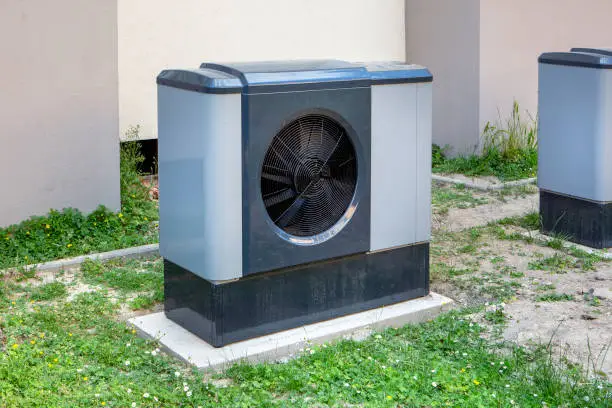
Air source heat pump
Air source heat pumps (ASHPs) absorb heat from the outside air to heat your home and hot water. They can still extract heat when air temperatures are as low as -15°C. Air source heat pumps need electricity to run, but because they are extracting renewable heat from the environment, the heat output is greater than the electricity input. This makes them an energy-efficient method of heating your home.
Think of an air source heat pump as a 'reverse fridge'. Heat is absorbed from the outdoor air and is compressed to raise the temperature. This then works to heat your home and hot water.
Before considering an ASHP, you must consider the following:
Do you have somewhere to put it?
You'll need a place outside your home where a unit can be fitted to a wall or placed on the ground. It will need plenty of space around it to get a good flow of air. A sunny wall is ideal. The external unit is connected to an internal unit containing circulation pumps and hot water, which is usually smaller than the average boiler.
What type of heating system do you have now?
Homes without an existing central heating system will require one to be installed for an air source heat pump to work.
What fuel will you be replacing?
The system is more likely to pay for itself if it's replacing an expensive system like electric heating. You're unlikely to save much on your heating bill if you're switching from mains gas.
Air source heat pumps can be installed in two varieties:
Air-to-Water Heat Pumps
These are the most common in the UK, transferring the heat into water which can then be used for traditional home heating elements.
Air-to-Air Heat Pumps
These work with a circulation system to heat the air itself.
The main benefit of an air source heat pump is a more energy-efficient method of heating your home, as it produces around 3.5 kW of heat for every 1kW of energy used. This efficiency also brings a significant saving on your carbon footprint, between 2,150 to 2,250 kg of carbon a year, compared to an A-rated boiler, according to the Energy Saving Trust.
Only air-to-water heat pumps are included in funding schemes. Currently, Government Funded Schemes offers fully funded options, subject to qualifying criteria. Air source heat pumps offer a great alternative to LPG gas & oil boilers, electric room heaters, and electric storage heaters. However, to work at their best, your home needs to be well-insulated.
If you are looking to invest in a new heating system but your home's insulation is not up to standard, an air source heat pump would not be a sound investment for the future. Air source heat pumps work best at producing heat at a lower temperature than boilers, so if you have a draught-proof home, this will increase efficiency.
It is also worth noting that while it is possible to use existing pipework and radiators when changing from a boiler to an air source heat pump, this is not guaranteed, and it is very likely that all will need to be replaced.
